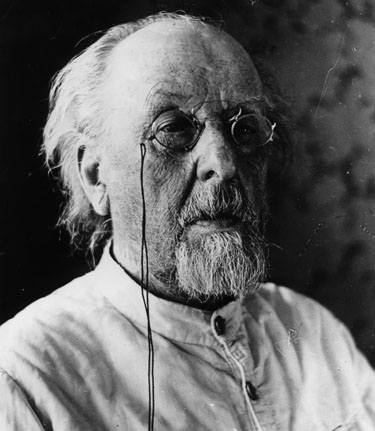Prominent Poles
Konstanty Ciolkowski (Konstantin Eduardovich Tsiolkovsky) Russian rocket scientist of Polish ancestry, pioneer of cosmonautics, visionary, inventor.

Born: September 5, 1857, Izhevskoye, Russia
Died: September 19, 1935, Kaluga, Russia
Early days. His father Edward, from a noble Polish family, was deported by the Russians (then occupying a part of Poland) to Siberia where he met and married a Russian woman. They had 18 children. At the age of 10 Tsiolkovsky lost hearing as the result of scarlet fever. After that he couldn't attend school, and he never received any formal education but was home schooled until 16. His books were his teachers, and he read every book in his father's small library. Tsiolkovsky later remembered that his hearing loss influenced greatly his future life: during all his life he tried to prove to himself and to others that he was better and more clever than others, even with his disability.
During 1873-1876 Konstantin Tsiolkovsky lived in Moscow. During this time he visited the main Moscow libraries and in this fashion he continued his self-education. While in Moscow, Tsiolkovsky was tutored by an eccentric Russian poet Nikolai Fedorovitch Fedorov, who was working in a Moscow library at the time. Fedorov gave Tsiolkovsky a place to work in the library. At the age of 17, while living in Moscow, he first dreamed about the possibility of space flight. He was, in part, inspired by the novels of French sci-fi writer, Jules Verne.
Teaching. In the period 1876-1879, after coming back to his father's home, he lived in Vyatka and Ryasan. In 1880, after passing exams, he received Teacher's Certificate, and went to work as a math teacher in Borovsk, Kaluga Province, till 1892. It was also at that time that he married Barbara E. Sokolova, the daughter of the local preacher. They had 3 daughters and 4 sons. In 1892-1935 he lived and worked in Kaluga. His moving to Kaluga was the result of a teaching promotion. Nearly deaf, he worked as a high school mathematics teacher until retiring in 1920.
Research. Tsiolkovsky theorized many aspects of space travel and rocket propulsion. He is considered the father of human space flight and the first man to conceive the space elevator. As early as 1894, he designed a monoplane which subsequently flew in 1915. He also built the first Russian wind tunnel in 1897. His most famous work was "The Exploration of Cosmic Space by Means of Reaction Motors", which published in 1903, was arguably the first academic treatise on rocketry. In 1903, as part of a series of articles in a Russian aviation magazine, Tsiolkovsky published the basic equation for rocket propulsion, named after him the Tsiolkovsky rocket equation. Tsiolkovsky's most famous quote is, "Earth is the cradle of humanity, but one cannot remain in the cradle forever." Unfortunately his ideas never made it out of Russia, and the field lagged until German researcher Friedrich Zander became enthusiastic about Tsiolkovsky's work and active in promoting and developing it. In 1924 he established the first Cosmonautics Society in the Soviet Union, and later researched and built liquid-fuelled rockets named OR-1 (1930) and OR-2 (1933). In 1929 Tsiolkovsky proposed the construction of staged rockets in his book "Cosmic Trains". In Kaluga he wrote his Cosmic Philosophy, and he dreamed about the far distant future of humanity, including the eventual conquest of space and our leaving the cradle of the planet Earth for the stars. He was made a member of the Soviet Academy of Sciences in 1919. In 1920 he received a government pension, and continued to work and write about space. He studied and proposed solutions for systems for interplanetary travel that today belong to the normal background for spatial flight: compensation chambers, double walls for protection from meteorites, combustion chambers, multistage rockets, space stations. He was also the first in Russia to build a wind tunnel to study the best profiles for the planes. He wrote over 500 scientific papers, and, even though he never created any rockets himself, he influenced many young Russian engineers and designers. Tsiolkovsky lived to see a younger generation of Russian engineers and scientists begin to make his visionary concepts reality. Tsiolkovsky died on September 19, 1935 in Kaluga, Russia, where there is a museum of astronautics named after him. He received an honored State funeral from the Soviet government.
Sources:
Wikipedia
Wolfram Research
torinoscienza
WIEM
Tsiolkovsky Museum in Kaluga
Return to home page:
Prominent Poles
